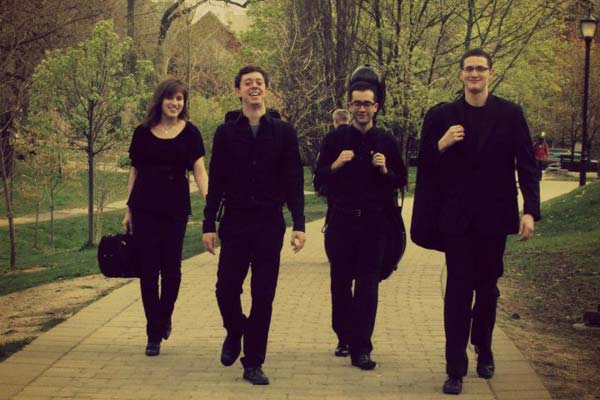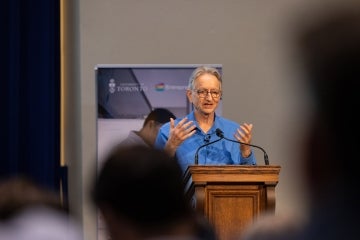
U of T student chamber ensemble debuts at Canadian Opera Company
Published: April 22, 2013
Some of them have been playing classical music together since they were toddlers—now the students in this University of Toronto chamber quartet are taking the stage at the Canadian Opera Company.
Chamber music ensemble The Arkadas Quartet comprises fourth-year students Emily Kruspe (violin), Jesse Morrison (viola) and Brandon Wilkie (cello), from the Faculty of Music and master’s student Jamie Kruspe (violin).
The Kruspes, as siblings, have been playing together since their mother began teaching them at age three. Joined by Wilkie and Morrison—who also took up violin lessons at the age of three— the award-winning musicians are now set to perform Beethoven's op. 74 'Harp' and the Ravel quartet in F major at the Canadian Opera Company’s free concert series on Thursday, April 25 from 12-1pm.
Emily Kruspe and Jesse Morrison spoke with U of T News about their music and the upcoming show.
You’ve been interested in classical music since before most people can read. So what is a violin lesson like for a three-year-old?
Jesse: It’s mostly just learning the structure of playing, your form and making sure everything is in place. Not so much things being in tune, but holding up your violin the proper way so there are no bad habits in the future. The most important thing is for a teacher to be patient with the kid but at the same time make sure they’re going down the right path so for the future they have the basics of the structure of how to play the instrument.
What do you like most about the instrument you play?
Emily: It’s a really singing instrument and it’s capable of so many different kinds of sounds. And no one can sound the same when they’re playing it. Everyone has their own unique way. I really like that. You can listen to almost any famous violinist and almost right away you can tell who it is just by how they play.
Jesse: Viola is the voice. The tone of it is related to the human voice in a lot of ways because of the register it’s in. It’s relatable to my voice and to other peoples voices, so that’s one thing that thing that drew me to it. Also it offers a different repertoire to play, different from what you often hear with violin. Of course, violin has a lot more repertoire than violas do, but that was one thing that interested me in viola, that I could explore different kinds of composers, different kinds of music and broaden my horizons.
How has being at U of T influenced your music?
Emily: I think mostly it’s been the performance opportunities for me. I’ve grown a lot and overcome a lot of nerves and insecurities through bonding with other musicians, and the profs are amazing and I always get a lot out of their master classes and coaching.
A few years ago I won the concerto competition at U of T, so that meant I got to play with the orchestra in November of this year. That was definitely the most terrifying experience. Not only do you have to play a ridiculous piece in front of a really big audience, but you have to play it in front of a whole orchestra sitting behind you. It was really overwhelming. But then the feeling that I got when it was finally [over] – for months I’d tried to imagine it, but it was never anything like how I actually felt. I thought I would be like crazy and peeing my pants with nerves but it was all right. It’s a surge of adrenaline and you just want to do more of it, keep doing it.
Also last year our quartet won the chamber music award at U of T, so we got to have our first recital in Walter Hall, which was great and also because of that we got to go to Banff for the summer chamber festival for three weeks and it was very intensive and fun.
Jesse: I would say it’s definitely helped with being an actual musician, going on stage and presenting a work and saying to myself, ‘This is something that I really enjoy doing,’ and, ‘This is what I can do with this piece or this work.’ It’s convincing myself and convincing the audience that what I do is what I love.
When I was young when I was performing, I don’t think I really appreciated what I was doing. Of course I liked it, but that’s what separates people who do it as a hobby and people who do it for their careers and for their life. I think the experience at U of T shaped how I think about my music and what I want to exactly do with it and what I want to reflect to the audience.
There’s a perception that young people aren’t interested in classical music—but you’re young people! What goes through your mind when you’re playing a piece?
Jesse: Some of the music you can probably think of people you may have met in your life, or characters in movies whether it’s fictional or non-fictional. You think of something really tragic in a Disney movie and kind of try to make the music according to that. But other characters in the music, if they’re hideous characters, you can try to think of comic books or video games. I think a lot about the setting and characters in video games. It’s really bad that I’m saying I play video games, I shouldn’t have said that—I should be practicing, not playing video games!
I also used to love comic books when I was young-- Marvel comic books like X Men. I sometimes think of all the characters and heroes in X Men, they’re are all very different, so you can find different elements in music that can relate to them or other characters that you’ve seen or read about or you’ve heard. You’re not sitting there playing thinking, ‘I’m thinking about X Men.’ It’s just the different elements you’ve seen in different characters that you try to put into the playing.
Emily: There’s a Bartok quartet we play-- he doesn’t write from the brain or the mind or head, he writes from the heart, so everything is just so emotional and driven and passionate. He’ll go from it being really serene and beautiful to all of a sudden a clash of notes that just don’t go together normally. I don’t know what it’s supposed to signify but we always thought of the movie Psycho.
(Listen below for an audio piece in which Kruspe and Morrison talk more about their approach to music and performance of the Bartok quartet)
Who is the audience for this free concert at the COC?
Emily: I know mostly it’ll be an older population-- it’s always like that at classical concerts, you get a sea of white heads. Young people are really focused on themselves and their progression. I mean, I’m ashamed to admit that I am as well. But I do think it’s really beneficial for young people to see other young people perform. They’re going through the same things and they can all learn from each other, so hopefully people can learn from us.
What will people like about the Beethoven piece you’ll be playing?
Emily: It’s really heroic sounding and it’s a great piece. Beethoven quartets are on a pedestal.
Jesse: I would just say it’s a really rich piece of music and it’s a really mature piece. Obviously classical music can turn off some of the younger people because they think they have to be drinking tea and wearing a tuxedo to appreciate this kind of music. But really it’s just very relatable, in even the younger generation. It’s full of a lot of different characters and long beautiful phrasing. It’s one of the most beautiful pieces ever written and it’s always a pleasure to play works by Beethoven.
What will people like about the Ravel piece you’ll be playing?
Emily: Ravel wrote it in 1903 as his final project for the Paris Conservatory. He brought it in and premiered it and everyone hated it. The person it was written for, his teacher at the time, Fauré, said it was a failure. But Ravel took a lot of ideas from Debussy and apparently Debussy said to him, ‘Don’t change a note!’ It’s one of the most performed quartets these days so he obviously knew what he was doing. It’s very French. It’s full of colour and just beautiful.
Jesse: Maybe people weren’t too turned on by it because they thought he was trying to be too extreme in his ideas. But it’s not different from any other composer writing what they believe strongly about. Maybe people were just horrified because they’d never heard something like that before and their first reaction was to shut it down and just say ‘That’s strange and I don’t like it.’ But, over time, they realized that was something really original and that it should be appreciated. It’s definitely a little bit more intense in some ways than your standard classical music, so it’s a little shocking for the audience and probably for us, but we know it’s coming so it’s not as crazy. But it’s mostly just really fun and super energetic and it passes by really quickly. So, for us, to make everything really special, to make everything count is very important.
Emily, tell me about your YouTube series.
I was preparing for the concerto competition, playing the Sibelius concerto and I was getting a little bored of practicing on my regular sized instrument. I took out the first violin I ever had and tried to play it and it was terrible. I practiced for about ten minutes and I made a video and I put it on Facebook first-- I didn’t start with YouTube because I was a little too shy. But I got good feedback from it so I made some more and put them all on YouTube. And a few Halloweens ago, I put on a giant mask and started to play the beginning of the Brahms concerto and a few lines in, while I played this tiny violin, the bow got stuck in the beard of the mask. It made for a really spontaneous and pretty funny video… it’s probably my favourite one. I have about six videos up there with about 60,000 views altogether, which is hilarious because the classical music world is not that big, so that means it’s been going around quite a bit. Also, a few months ago I had my graduating recital and as an encore piece I brought on the tiny little violin and played an encore on that.
Will you be bringing it out at the COC free concert?
I’m guessing I won’t be doing that. I mean, it’s an idea. But I think that would that would turn people away...



